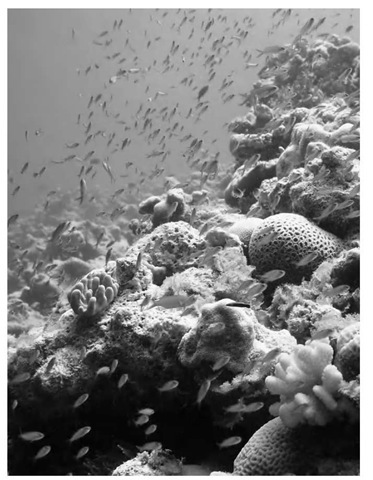The republic of the Marshall Islands (RMI) is a Pacific island nation that inhabits a fragile atoll ecosystem with no significant elevation above sea level. Susceptibility to tropical storms and economic dependence on coral reef ecology combine to produce a high risk that climate change will threaten the nation’s survival. RMI can do little to ameliorate or reduce potential impacts. It is likely that land mass will be reduced, storm damage will increase, and the coral reef ecosystem will disintegrate with increasing ocean temperature, rising sea level, and atmospheric disturbances. RMI has been among the leading nations advocating a planetary response to these issues, most notably through testimony before the United Nations Climate Change Conference and UN Security Council, and active involvement in the Alliance of Small Island States. RMI consists of 29 coral atolls organized into the Ratak and Ralik chains in the western Pacific Ocean located between 2-14 degrees north and 160-173 degrees east. Total land area of RMI is 69.5 sq. mi. (180 sq. km.), with an average elevation of less than 6.5 ft. (2 m.). RMI population is 59,071 (2005 est.), with 38.2 percent of the population under age 15. The Marshal-lese are Micronesians who migrated from Asia several thousand years ago. More than half of the population is concentrated in two locations: Majuro, an atoll containing the capital city of Majuro; and Ebeye, an islet adjacent to the U.S. military base on Kwajalein Atoll.
Damselfish swarm around a coral reef in the Republic of the Marshall Islands, which consists of 29 Pacific coral atolls.
RMI became an independent nation in 1986, but remains economically dependent on the United States due to historic and current military installations. Most commercial fishing is by licensed foreign fisheries. Small farms produce coconuts, tomatoes, melons, and breadfruit. Small-scale industry is limited to handicrafts, fish processing, and copra. Cultural integrity has historically been tied to land- and ocean-based food production. Environmental degradation accelerated by nuclear testing and military uses of some atolls complicates the challenge of developing sustainable lifestyles on these overpopulated, resource-poor atolls. The undeveloped economy results in low greenhouse gas emissions by the RMI.
Global climate change effects on RMI will include sea level rise, coral bleaching, saltwater intrusion, and the increased frequency of tropical storms. Solid waste disposal, availability of potable water, fisheries depletion, and overpopulation reduce the ability of the nation to react to climate change. For example, on March 21, 2007, the RMI government declared a state of emergency after a prolonged drought. Erosion of the extensive ocean/land interface, already escalating with a relatively small sea level increase, presents a serious challenge. Bleaching and coral death have interrupted the natural cycle of coral replenishment and may cause the collapse of the coral reef ecosystem. Prevailing wind patterns have largely protected these islands from severe tropical storm damage, but shifts in storm movement patterns are allowing more frequent and direct storms.

